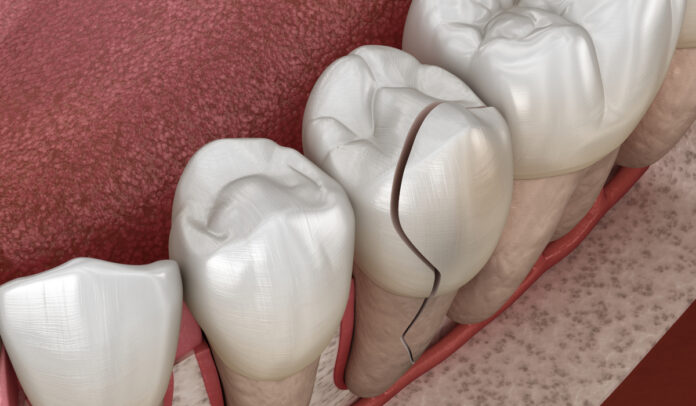The type of treatment your tooth requires depends on the severity of the damage.
Have you recently had an accident that has resulted in a cracked tooth? Or perhaps your tooth has become cracked from biting down on hard foods. Whatever your reason for requiring treatment for cracked teeth, there are many options available. This article will explore the different types of tooth cracks and how they may be saved with proper dental care. We will also discuss when a tooth is unable to be saved and must be extracted.
Types of Tooth Fractures and Cracks
To put it simply, a cracked tooth is a tooth that has somehow become broken or fractured. However, not all teeth will crack in the same way. There are several ways your teeth can crack:
- Cracked Tooth – when the crack runs down towards the root
- Split Tooth – this is the result of an untreated cracked tooth
- Craze Lines – tiny cracks that require no treatment
- Cracked Cusp – if the pointed part of the tooth gets damaged, the tooth may break
What Causes Teeth to Crack?
There are several reasons why a tooth can crack. Here are a few common dental issues that can cause the tooth to become damaged:
- Tooth Grinding
- Teeth Weakened by Large Fillings
- Biting Hard Foods
- Tooth Trauma
- Gum Disease
Why You Should Repair Damaged Teeth
Neglecting your cracked tooth can be detrimental to your oral health. It is essential to get your tooth fixed as soon as possible to avoid other costly treatments. If you do not get your cracked or damaged tooth repaired quickly enough, it could lead to an infection spreading into the mouth and jaw. While cracked teeth can be challenging to treat, your dentist will evaluate the tooth’s health to identify which treatment is best. During your appointment, your dentist will look for:
- Depth of Crack
- Orientation of Crack
- Periodontal and Pulpal Involvement
There are some types of cracks that generally never require any treatment. For instance, craze lines usually do not require treatment unless the patient has a cosmetic issue. This is because craze lines do not go into the dentin and the pulp remains unaffected. In contrast, fractures that extend into the root are usually unable to be saved.
How Are Cracked Teeth Fixed?
The type of treatment that your tooth requires depends on the severity of the damage. If your tooth becomes damaged or cracked, you should schedule a dental appointment to discuss the best treatment options. Here are a few treatment options that your dentist may suggest:
- Bonding – Bonding uses plastic resin to fill the crack. This method can also help restore the shape of the tooth, if necessary.
- Dental Veneers – This treatment is ideal when the patient has a lot of teeth remaining. Because veneers are long-lasting, they need little tooth removal before fitting. A veneer is a porcelain or plastic layer that is custom made to fit over the front of the tooth surface.
- Cosmetic Contouring – This technique is usually done when the damage is very small. The edges of the chip are rounded and polished to achieve a blending of the crack.
- Dental Crowns – Crowns are an alternative to veneers, as they are used when veneers are not possible. A crown is fitted over the top of what is left of the tooth. This helps to make the tooth strong once again, giving it the appearance of a natural tooth. However, if the nerve has also been damaged, then you will require a root canal to remove the infection.
It is important to remember that if the tooth has broken down to the root, then there is, unfortunately, no way to save the tooth. In this case, the tooth will need to be extracted. Once the tooth has been extracted, one treatment for this is either an implant or bridge implanted.
What are the differences in cost between the different methods of repair?
Methods of Repairing Cracked Teeth and Costs
The cost of each treatment will vary greatly depending on which treatment you need and your dentist’s location. Your dentist will charge by how much time the treatment takes and the resources that are needed to save the tooth. While in many cases, dental insurance can cover some of the costs, this is not a guarantee.
- Bonding – $300 to $1,000
- Dental Crowns – $800 to $2,500
- Dental Veneers – $800 to $1,500
- Root Canal – $700 to $1,000
The Takeaway
When a tooth becomes cracked or fractured, you may be concerned about whether it can be saved. In some cases, your tooth may need to be extracted. But it is important to seek dental advice to get the tooth assessed. Generally, the rule of thumb, is that if the fracture has not run down to the root, that the tooth is salvageable. If your tooth is not treated as soon as possible, it could lead to nerve damage, an abscess, or extraction that could have been avoided.














